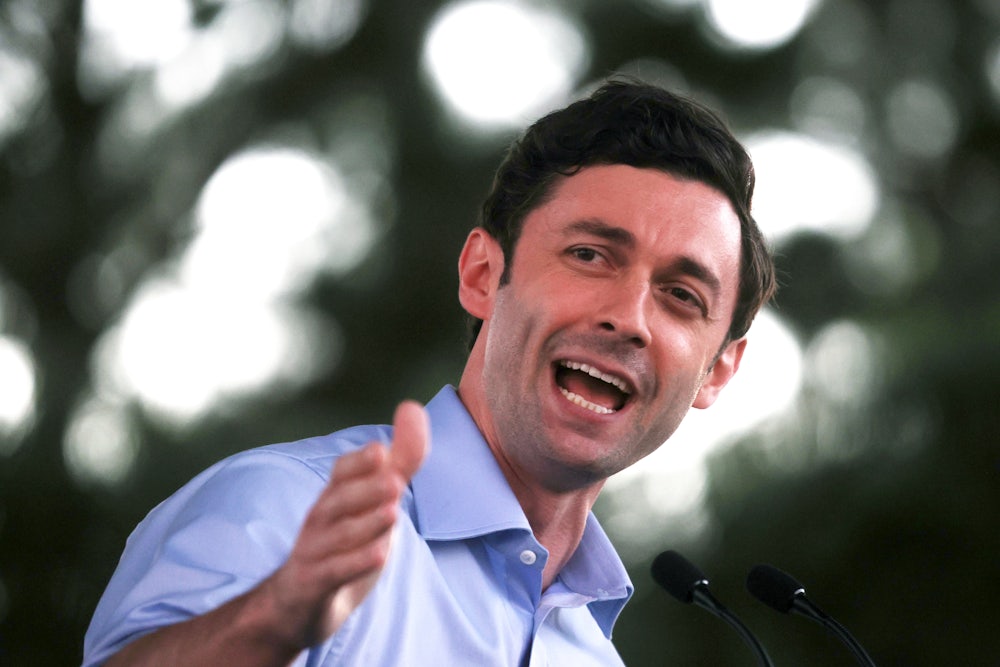During a recent Axios on HBO interview, Jon Ossoff, the perpetual Democratic candidate who faces Georgia Republican Senator David Perdue in a January runoff election, was asked whether he supports a suite of left-wing policies. The first item on the interviewer’s list, the Green New Deal, earned a quick “no” from Ossoff, who smirked at times as he declared his opposition to most of the progressive agenda. Medicare for All, abolishing ICE, defunding the police, expanding the Supreme Court: no, no, no, no.
But here’s why policy discussions shouldn’t be framed as a series of rapid-fire yes/no questions: Ossoff’s opposition to the Green New Deal reveals next to nothing about his actual views on climate change. On his website, as it happens, he calls for “rapidly transitioning to clean energy sources, dramatically reducing carbon emissions, and increasing energy efficiency.” This can be accomplished, he says, by a “historic infrastructure plan that includes massive investments in clean energy, energy efficiency, and environmental protection.”
A huge infrastructure plan, you say? One that reduces emissions while also providing well-paying jobs? That sounds mighty familiar. Ossoff clearly endorses something Green New Deal–ish, but, like many Democrats in his position, he can’t find the words (or the courage) to say so.
The Green New Deal as a concept can be somewhat amorphous because there’s not a bill outlining specific concrete steps that would be taken to reduce emissions. The 2019 resolution introduced by Senator Ed Markey and Representative Alexandria Ocasio-Cortez was, by design, open-ended. But the basic premise—that government needs to make a massive investment in reducing emissions, a project that would provide jobs and make the United States cleaner—is fairly uncontroversial among Democrats, from President-elect Joe Biden on down.
But the phrase Green New Deal has taken on a lot of baggage, thanks mostly to an intense right-wing misinformation campaign. In 2019, Fox News went on an anti–Green New Deal blitz that led to Republicans being more familiar with the words “Green New Deal” than Democrats, according to one poll. The right ignored the basic concept of the proposal, instead fixating on the bizarre charge that socialists wanted to take away your hamburger.
These attacks have not entirely succeeded. Polling from Data for Progress shows high levels of support for the Green New Deal, including a majority of respondents in Ossoff’s Georgia. But other polls have indicated that Ocasio-Cortez and other members of the left-wing “Squad” are unpopular in swing states: Ossoff may have good reason to distance himself from a policy associated with that wing of the party, even if the Green New Deal isn’t toxic itself.
Faced with this bind, moderate Democrats like Ossoff have chosen to denounce the Green New Deal even while agreeing with its core principles. Biden leads the way in this regard, insisting during a debate with President Trump that he did not support the Green New Deal but rather the “Biden Green Deal.” It went unsaid that Biden’s climate plan includes many of the same ideas as the Green New Deal.
This is not hypocrisy, necessarily. It’s not clear whether shying away from the Green New Deal helped Biden in the states that delivered him the presidency, and it’s not obvious that doing so will help Ossoff this winter. But if his campaign has sound reasons for believing it will, Ossoff can say whatever he thinks he needs to say to win a tight race in a red state. If he wins, though, he should be held to his promise to support a “historic infrastructure plan” that reduces emissions.
Climate activists helped Biden win the presidency, despite his being perhaps their least favorite of the primary candidates. Those same activists will no doubt go to bat for Ossoff in Georgia, even if he dismisses their signature policy in a televised interview. They’re doing so because they believe the stakes are high: They think that the only way to fight the climate catastrophe is to ensure Democrats, not denialist Republicans, control the federal government. At a time of such urgency, nomenclature is the least of our concerns. As long as his agenda says “yes,” Ossoff can say “no” all he wants.
